SERVICE

Healthcare
-
01
There is a wide range of issues businesses face in the healthcare field. These include tightening of finances due to the aging and declining population, response to social security system reforms such as the medical insurance system and long-term care insurance system, differentiation of hospital bed functions such as high acuity, general acuity, recovery, and chronic care, and planning and implementation of a comprehensive regional care systems.
Consolidation and reorganization of medical institutions will be inevitable in the future, considering the countermeasures against infectious diseases, including COVID-19, and the worsening of hospital management as a result. Healthcare providers are required to respond to policy changes as well as to further improve the efficiency of hospital management.
Utilizing our experience in numerous construction projects, Index Group strongly supports the realization of sustainable hospital management by formulating management strategies and plans in anticipation of future policy changes, and by optimizing the construction and maintenance costs of hospital facilities.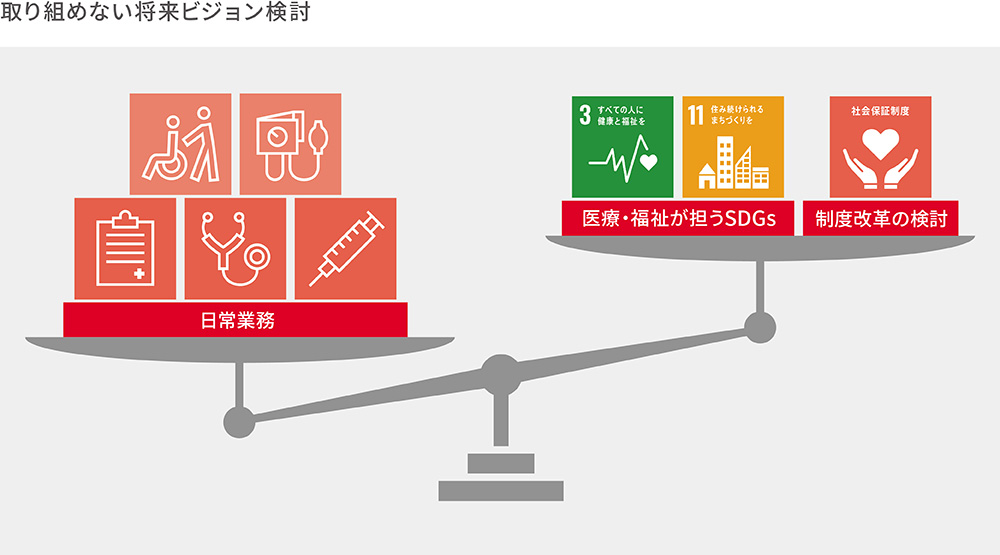
-
02
Formulation of management strategies and plans for healthcare businesses
Regular revisions to medical and nursing care fees have a significant impact on the management of healthcare service providers. In addition, as the national government begins to reorganize the functions of hospital beds, in order to establish itself as a core hospital in the region, a hospital needs to deepen cooperation with local governments and other medical institutions in the region, to work with the urban development of aging communities, and to provide excellent medical care and cutting-edge treatment equipment. In addition, we are now in an era where the introduction of AI/IoT for SDGs initiatives and digitalization is being considered from the facility planning stage.
In order to achieve this, it is essential to set up a specialized team from the conceptual stage, based on the discussion of the facility configuration as a conventional medical institution, to reconfirm and realize the vision, such as "which therapeutic areas will be put forward as strengths," "how to collaborate with the community," and "what should the facility be like for the introduction of cutting-edge technologies”.
Specifically, we form an optimal consortium with external partners who excel in specialized fields such as medical consulting, strategic consulting, accounting, and law. We coordinate the development of management strategies and plans that meet the various needs of the concerned businesses and lead the project to success.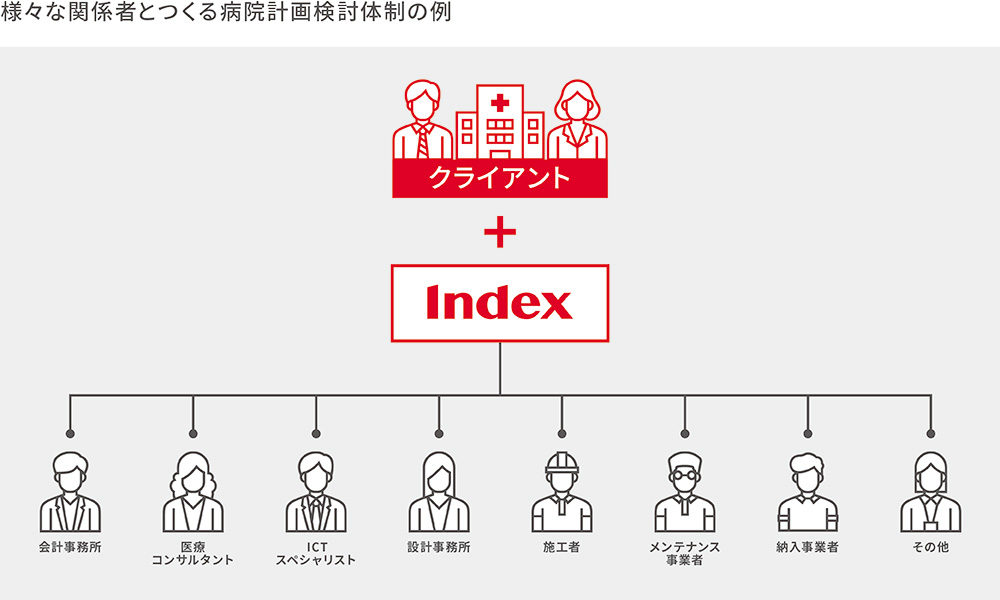
In addition, in order to study and create plans for regional cooperation in healthcare, such as a comprehensive regional care system, it is necessary to consult with local governments and regional healthcare providers, and cooperation with private businesses is also essential to the realization of the project. It is not easy to bring together the opinions of different stakeholders and draw out the vitality of the private sector. At the request of local governments, Index Group provides support for new initiatives in healthcare, including the establishment and operation of study meetings, workshops, and public-private partnership councils. Our strength is also in public-private partnerships, being able to propose and construct schemes that utilize outside funding and know-how for facility construction and equipment installation.
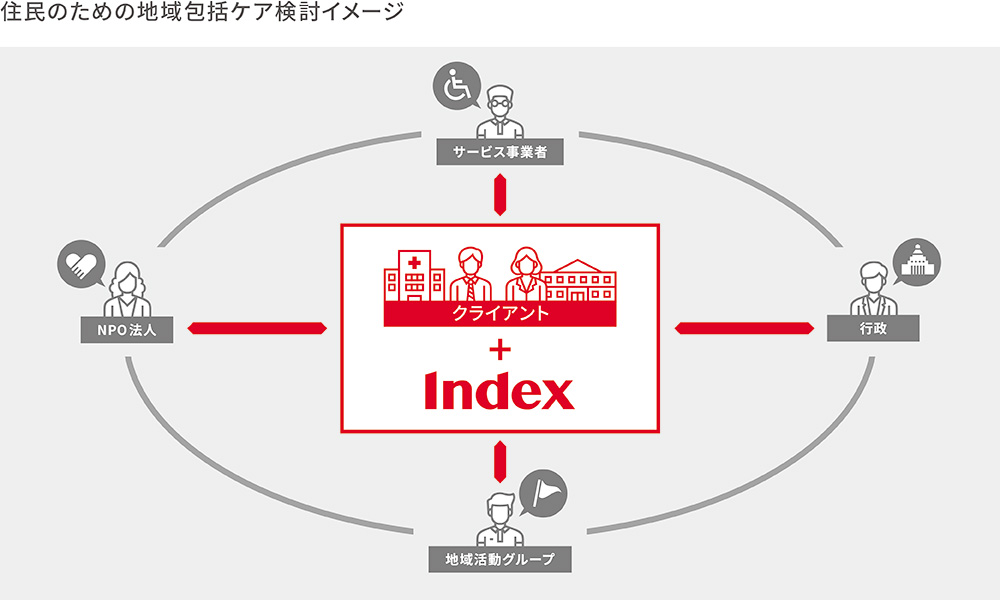
-
03
Cost Reduction in Construction, Reconstruction, and Maintenance of Facilities
Compared to the construction of corporate offices and factories, the cost of construction and reconstruction of healthcare facilities often remains high or exceeds the budget. In future construction and reconstruction plans of healthcare facilities, it is inevitable to optimize costs and keep within a set project budget. Therefore, it is important to involve experts who have the experience and know-how to control construction costs while considering the expected medical practices and income at the project planning stage.
For example, in the early stages of most project, the design office takes the lead in promoting the project. While it is important to finalize the construction plan and basic design at an early stage, two major risks need to be avoided. The first is to develop a business plan, medical vision, and facility plan with expert supervision before the design to enhance business potential and medical practice. The second is to consider strategies related to procuring, such as what to ask the design firm to do, from which stage the construction company will participate, and what medical equipment to use.
If we don't consider these issues sufficiently, the cost of construction, medical equipment, and other related expenses may remain high. In fact, we have seen hospital construction projects that have gone way over budget. What these projects have in common is the lack of competition and the over-specification of facilities that do not affect the medical practice or income. For example, cost optimization can be achieved by simply considering more than one procuring method.
The separate design-build method, where the design office does the design and the construction company does the construction, is common in hospital construction, but if we use the single design-build method, where the construction company does both, we can take full advantage of the cost reduction know-how of the company. The procurement of medical equipment is also a major cost for hospitals, but if this is done through a bidding process, it will be possible to optimize the cost.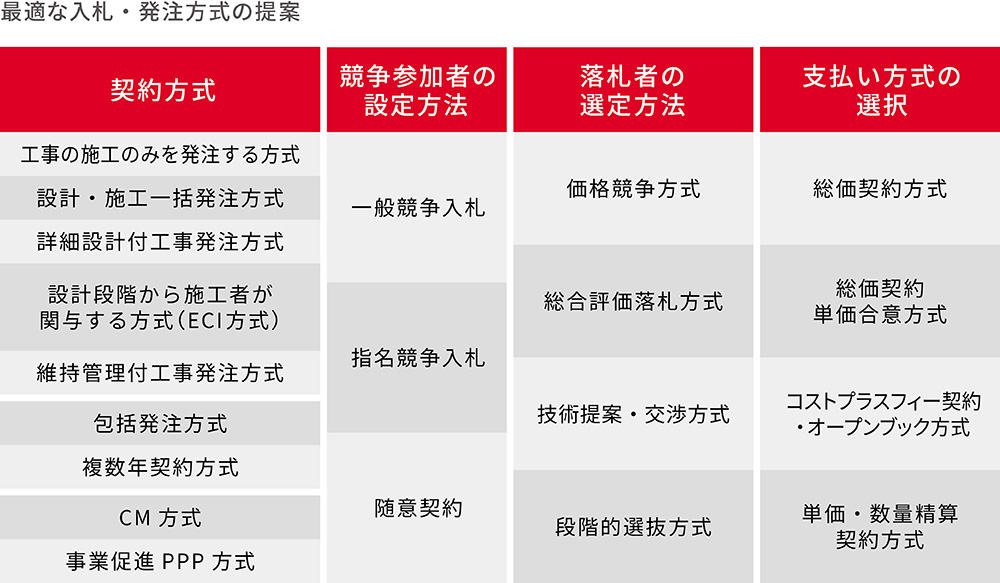
For facilities adjacent to the hospital that generate revenue, such as lodging facilities, parking lots, and cafeterias, an effective method of cost optimization is to sell the management rights and consider outsourcing facility maintenance to the private sector.
The same applies to the main facility maintenance as well. As medical services in hospitals become more complex and sophisticated, a high level of cooperation among doctors, nurses, and administrative staff is required, and efficient facility and energy operation and management systems are becoming indispensable to reduce the costs.
Index Group has rich experience in facility management and can provide advice on reducing maintenance and management costs and building optimal management and operation systems.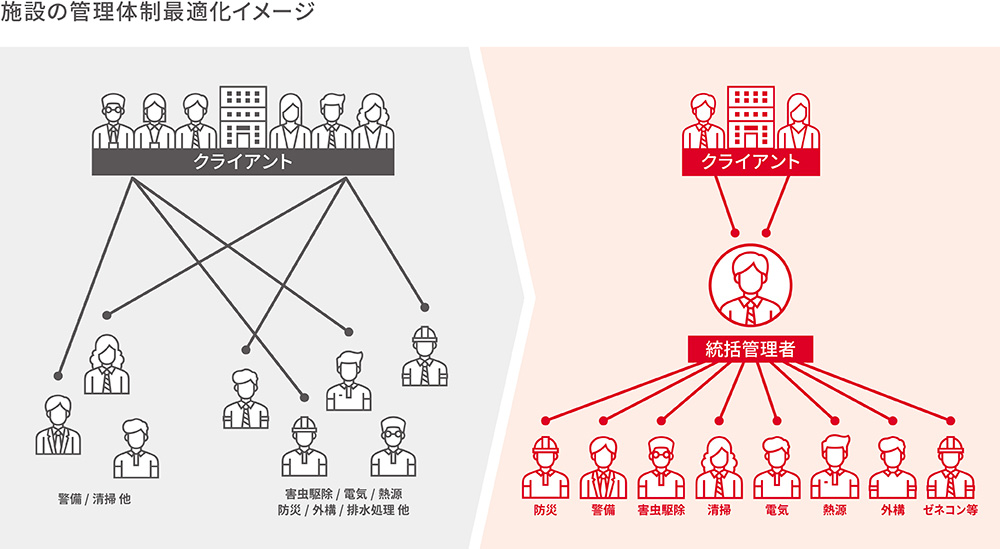
Healthcare service providers are required to manage hospitals in a sustainable manner. We believe that the most important point in hospital management is to maintain the facilities that are needed at an appropriate cost. Index Group has a wealth of know-how on how to improve the efficiency of facility development, and we can help you develop the best strategy and realize the best facility development for your healthcare needs.